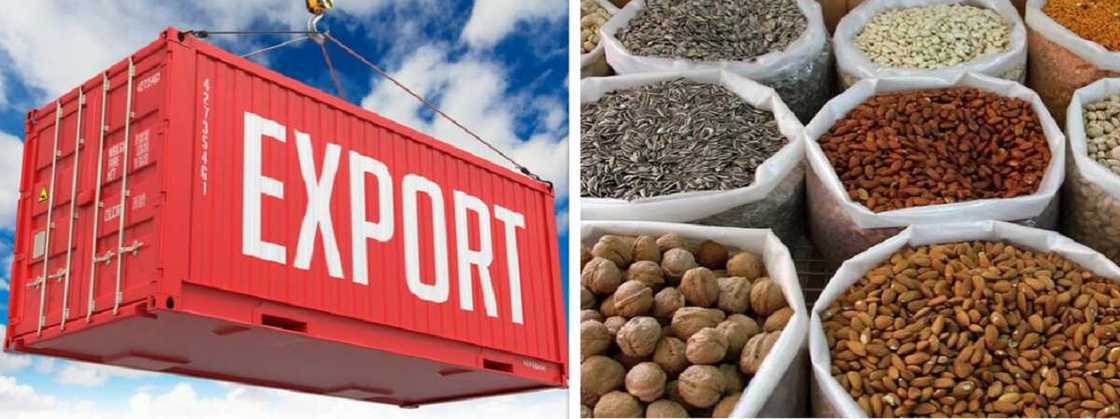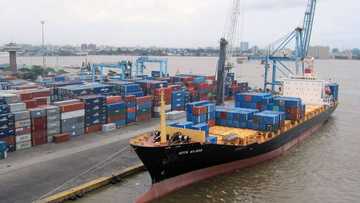NPA Commissions Diamond Star's Export Processing Terminal in Lagos
- Succour has come for exporters as NPA inaugurates an export processing terminal in Lagos
- Exporters will be allowed to export selected commodities with the payment of little or no duty.
- "The initiative is in line with the authority's commitment to the implementation of the National Action Plan on agro-export," NPA boss said.
PAY ATTENTION: Click “See First” under the “Following” tab to see Legit.ng News on your Facebook News Feed!
The Nigerian Ports Authority has commissioned the first export processing terminal, courtesy of Diamond Star Export Processing Terminal, in Lagos.
Located in Lilypond in the Ijora area of Lagos, the processing zone is expected to ensure quick and easy processing of export cargoes through Apapa and Tin-Can Island ports in Lagos, the News Agency of Nigeria reports.

Source: Getty Images
PAY ATTENTION: Share your outstanding story with our editors! Please reach us through info@corp.legit.ng!
What is an Export Processing Zone
An Export Processing Zone (EPZ) is a Customs area where one is allowed to import plant, machinery, equipment and material for the manufacture of export goods under security, without payment of duty. The imported goods are subject to customs control at importation, through the manufacturing process, to the time of sale/export, or duty payment for home consumption.
Stakeholders commend the inauguration of the Export Processing Terminal
The Managing Director of NPA, Mohammed Bello-Koko, who spoke at the commissioning stated that the terminal, apart from helping to reduce wastages, would speed up the time exports gained access to ports and check the rejection of export goods from Nigeria.
The NPA boss noted that the project was in line with the Federal Government’s desire to diversify the national economy from oil to non-oil export. He added that the initiative is also in line with the authority's commitment to the implementation of the National Action Plan on agro-export.
He said the export terminal will operate as a holding location to help exporters prepare for the arrival of export products given the traffic challenges imminent in Lagos, the country's economic nerve centre.
Commending the Nigeria Customs Service (NCS) for creating an export command, Bello-Koko said that the authority would work with the Customs’ Export Command to bring up seamless modalities that would govern export trade.
Also speaking at the inauguration, the Executive Director of the Nigerian Export Promotion Council (NEPC), Mr Ezra Yakusak, said the terminal would help to create more room to increase the volume of non-oil exports in Nigeria.
The terminal could handle about 50,000 boxes of export containers on a weekly basis and would help to grow Nigeria’s export trade by reducing the trade imbalance, the Managing Director of Diamond Star Port and Terminals Ltd., Mr Olatunji Baale, said.

Source: Original
Challenges of exporting products from Nigeria
In recent years, a number of exporters have lamented the challenges associated with exporting products, especially food items. The persistent rejection of food and agricultural commodities from Nigeria on account of poor quality has been a concern for both exporters and regulators.
In February 2022, the Central Bank of Nigeria in an effort to encourage the non-oil export sector, introduced the RT200 FX Programme. Working with the deposit money banks, the CBN hopes to fund the construction of dedicated non-oil export terminals, so as to eliminate the difficulties experienced by exporters.
The CBN plans to raise $200 billion in foreign exchange earnings from non-oil sources in 5 years by giving exporters N35 for every 1 dollar repatriated through the I&E forex window.
Under the programme, the CBN, working with the Money Deposit Banks, is to fund the construction of dedicated non-oil export terminals, to eliminate the delays currently experienced by exporters.
The policy seeks to raise $200 billion in the next five years in forex earnings from non-oil sources by giving N35 rebates to exporters for every dollar repatriated through the Investors ‘and Exporters’ Forex window.
22 priority products that can earn Nigeria $30 billion by 2025
22 products have been identified to have the potential to enable Nigeria to achieve a zero-oil plan to diversify Nigeria’s export portfolio away from oil.
According to the NEPC, the target is to attain $30 billion in non-oil exports by 2025 and 500,000 additional jobs created annually. The priority products which are in two categories include:
Category A: Palm Oil, Cotton & Yarn, Petrochemicals & Methanol, Rice, Soybean, Sugar, Hides and Leather, Nitrogenous Fertilizer & Ammonia, Rubber, Cocoa and Gold.
Category B: Ginger, Cassava, Cement and Clinkers, Banana & Plantain, Oranges, Sesame, Cashew, Spices, Tomato (fresh and partly processed), Shea Butter and Cowpea.
Nigeria’s top agricultural exports in the first half of 2022
According to a breakdown of the National Bureau of Statistics' foreign trade report, N343.4 billion worth of agricultural goods were exported from Nigeria between January to June 2022. This shows an increase of 17.3% from N292.8 billion achieved in the first half of 2021.
The top agro exports include the following:
Cocoa – N114.1 billion
Sesame seeds – N81.5 billion
Cashew nuts – N67.39 billion
Desiccated Coconuts – N13.86 billion
Ginger – N12.63 billion
Cocoa butter – N8.79 billion
Frozen foods – N8.11 billion
Plants – N6.47 billion
Palm nuts and Kernels – N3.72 billion
Brazil buts – N2.89 billion
Source: Legit.ng






